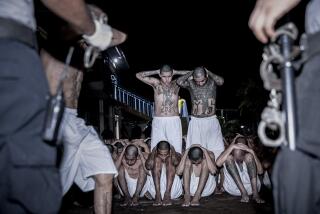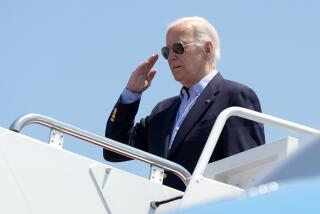Tutu to Head S. African Panel on Apartheid-Era Crimes : Justice: Nobel-winning archbishop will lead probes of white-led government and its foes. Commission may grant amnesty, restitution.
Archbishop Desmond Tutu, who won the 1984 Nobel Peace Prize for his impassioned leadership of the anti-apartheid struggle, was appointed Wednesday as chairman of South Africa’s new panel to investigate past political crimes and human rights abuses.
President Nelson Mandela named Tutu, the Anglican archbishop of Cape Town, and 16 others to the Truth and Reconciliation Commission, which is empowered to look into the apartheid-era actions of both the white minority regime’s security forces and the black-led forces that battled them.
Those who come forward and fully confess their crimes to the commission may apply for amnesty from prosecution. Those who refuse to appear or to answer the panel’s questions may be sentenced to two years in jail. In some cases, it will be able to award restitution or compensation to victims.
The commission will be guided “by the need for understanding but not for vengeance, the need for reparation but not for retaliation,” said Mandela’s chief of staff, Jakes Gerwel, citing the country’s interim constitution.
Gerwel said the aim of the panel is to reach “an understanding of our past” and thus promote reconciliation “of this once deeply divided and conflict-ridden society.”
The commission, which will have only 18 months to do its work, has authority to consider crimes committed from March, 1960, when the African National Congress and other anti-apartheid groups were banned by the government, to December, 1993, when the present constitution was ratified.
Among the infamous cases expected to be examined are the death in police custody of black activist Steve Biko in 1977, the torture and killing of political opponents in ANC military camps in Angola in the 1980s and suspected police involvement in a massacre of more than 40 people in Boipatong, a black township south of Johannesburg, in 1992.
The panel may also be asked to examine a case now roiling the country--the arrest of former Defense Minister Magnus Malan and 10 other top military and intelligence officials from the apartheid era. The men have been charged with 13 counts each of murder in connection with a 1987 massacre.
But officials have cautioned that the panel will not try to solve the tens of thousands of murders, disappearances, cases of torture and other abuses that occurred as the white-led government fought to retain power. Nor do officials expect to resolve the thousands of deaths involving rival black political groups.
The commission has been controversial since it was first proposed. Left-wing groups have called for prosecution of apartheid’s killers, rather than the absolution they would get from confessing their crimes. Right-wing groups fear persecution and public humiliation of people they regard as upholding the established order.
Tutu’s appointment was widely expected. Now 64, he had planned to retire in March as head of the Anglican Church in South Africa and teach at Emory University in Atlanta, but he said recently that he would not turn down Mandela’s appointment. He was flying to New York on Wednesday and could not be reached for comment.
Lawyers and human rights activists dominate the commission, but it also includes physicians, academics and a psychologist who specializes in treating people traumatized by violence. Major political parties are represented, including by a white lawyer long affiliated with right-wing, segregationist groups. His nomination was widely denounced by human rights groups.
More to Read
Sign up for Essential California
The most important California stories and recommendations in your inbox every morning.
You may occasionally receive promotional content from the Los Angeles Times.







